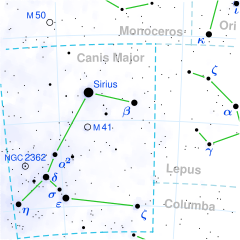| Observation data Epoch J2000.0 Equinox J2000.0 (ICRS) | |
|---|---|
| Constellation | Canis Major |
| Right ascension | 07h 14m 48.65387s[1] |
| Declination | −26° 46′ 21.6097″[1] |
| Apparent magnitude (V) | 3.60 - 4.18[2] |
| Characteristics | |
| Spectral type | B2.5Ve[3] |
| U−B color index | −0.73[4] |
| B−V color index | −0.14[4] |
| Variable type | γ Cas[2] |
| Astrometry | |
| Proper motion (μ) | RA: −11.88[1] mas/yr Dec.: +6.87[1] mas/yr |
| Parallax (π) | 3.58 ± 0.17 mas[1] |
| Distance | 910 ± 40 ly (280 ± 10 pc) |
| Absolute magnitude (MV) | −3.21[5] |
| Details | |
| Mass | 10.1±0.7[6] M☉ |
| Radius | 6.2[7] R☉ |
| Luminosity | 13,081[8] L☉ |
| Surface gravity (log g) | 3.5[9] cgs |
| Temperature | 21,878[9] K |
| Rotational velocity (v sin i) | 80[10] km/s |
| Age | 22.5±2.6[6] Myr |
| Other designations | |
| Database references | |
| SIMBAD | data |
Omega Canis Majoris, Latinized from ω Canis Majoris, is a solitary,[12] blue-white-hued star in the equatorial constellation of Canis Major. It is visible to the naked eye with an apparent visual magnitude of about 4. Based upon an annual parallax shift of just 3.58 mas as seen from Earth,[1] this system is located roughly 910 light-years from the Sun.

This star has a stellar classification of B2.5Ve, indicating it is a main sequence Be star, although it has also been classified as a subgiant.[14] One of the most observed Be stars of the Southern Hemisphere,[15] Omega Canis Majoris is classified as a Gamma Cassiopeiae-type variable star.[2] Both the luminosity and the radial velocity vary with a primary cyclical period of 1.372 days.[16] The variation in brightness, ranging from magnitude +3.60 to +4.18,[2] shows changes over time, which suggests there are two overlapping periods of 1.37 and 1.49 days. The star also undergoes transient periodicities following outbursts.[17][10]
This is a massive star with ten[6] times the mass of the Sun and 6.2[7] times the Sun's radius. At an estimated age of 22.5 million years,[6] it is radiating 13,081[8] times the Sun's luminosity from its photosphere at an effective temperature of 21,878 K.[9] The star is being viewed nearly pole on, so the measured projected rotational velocity of 80 km/s is only a fraction of the true equatorial velocity, estimated as 350 km/s. It is surrounded by a symmetric circumstellar decretion disk of material that is being heated by the star, which in turn is inserting emission lines into the combined spectrum.[10]
- ^ a b c d e f Cite error: The named reference
vanLeeuwen2007was invoked but never defined (see the help page). - ^ a b c d Cite error: The named reference
Samus2017was invoked but never defined (see the help page). - ^ Cite error: The named reference
slettebak1982was invoked but never defined (see the help page). - ^ a b Cite error: The named reference
Feinstein1979was invoked but never defined (see the help page). - ^ Cite error: The named reference
Anderson2012was invoked but never defined (see the help page). - ^ a b c d Cite error: The named reference
Tetzlaff2011was invoked but never defined (see the help page). - ^ a b Cite error: The named reference
Underhill1979was invoked but never defined (see the help page). - ^ a b Cite error: The named reference
Hohle2010was invoked but never defined (see the help page). - ^ a b c Cite error: The named reference
Soubiran2010was invoked but never defined (see the help page). - ^ a b c Cite error: The named reference
Stefl2010was invoked but never defined (see the help page). - ^ Cite error: The named reference
SIMBADwas invoked but never defined (see the help page). - ^ Cite error: The named reference
Eggleton2008was invoked but never defined (see the help page). - ^ Cite error: The named reference
Stefl2003was invoked but never defined (see the help page). - ^ Cite error: The named reference
Skiff2014was invoked but never defined (see the help page). - ^ Cite error: The named reference
Ghoreyshi2016was invoked but never defined (see the help page). - ^ Cite error: The named reference
Harmanec1998was invoked but never defined (see the help page). - ^ Cite error: The named reference
Stefl2000was invoked but never defined (see the help page).
